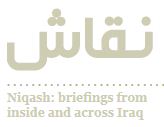The one percent in iraq: surveys show gap between rich and poor widening
by Ahmad al-Rubaie on 29-09-2013
BRussells Tribunal
As
one global consultancy was busy ranking Iraq the sixth wealthiest
country in the Middle East, another local survey indicated that over six
million Iraqis live below the poverty line.

While wealthy Iraqis live in luxury, those living below the poverty line live in shacks.
 On
the same day as a list of the Middle East’s wealthiest ranked Iraq the
sixth richest country in the region, Musab al-Hamid found that he was
part of the 19 percent or so of Iraqis living under the poverty line, as
specified by a Ministry of Planning survey.
On
the same day as a list of the Middle East’s wealthiest ranked Iraq the
sixth richest country in the region, Musab al-Hamid found that he was
part of the 19 percent or so of Iraqis living under the poverty line, as
specified by a Ministry of Planning survey.
“The wages I earn are barely enough to cover the needs of my family,”
al-Hamid told NIQASH; he is the head of an eight person household in
Baghdad. Al-Hamid added that he knows many families who live in shacks
made of sheets of old metal and who boil water and flour to feed their
children.
The survey that al-Hamid was included in was undertaken by the Iraqi
Ministry of Planning. The percentage of those living under the poverty
line – defined by the World Bank as at between US$1.25 and US$2 a day –
has hovered around the 20 percent mark for several years in Iraq. This
is estimated at around 6.4 million people, mostly from rural areas.
Meanwhile at the other end of the scale, Wealth-X, a consultancy with
offices around the world, that specializes in documenting the
ultra-wealthy, ranked Iraq number six in the Middle East on their World Ultra Wealth Report 2013. The report suggested that rich Iraqis each had a fortune of more than US$30 million.
Although the Wealth-X report did not name Iraq’s wealthiest
individuals, many locals cannot help but suspect that the names would
include Iraqi politicians and their families.
“All the Iraqi people know that they can become rich by using political
influence and by capitalizing on the hundreds of government projects,
all of which generate a lot of profits,” says Mohammed Hamid, whose name
also made it onto the Ministry of Planning’s poverty list.
“There must be something done to restore social balance,” Hamid told
NIQASH. “It’s not reasonable that most of the country’s wealth is
enjoyed by a small number of people while many other Iraqis are deprived
of it.”
Experts in the area agree. Maytham Luaibi, a professor of economics at
Baghdad’s University of Mustansiriyah attributes the rising number of
wealthy in Iraq to what he calls “the marriage of trade and politics”.
Luaibi blames Iraq’s rentier economy. The economic and
political theory on “rentier states” says that a nation that derives
most of its income from one natural resource, such as oil, doesn’t need
much other domestic economic activity. Taxes are not as important and
the government is not held as accountable by electors. And Luaibi believes most of Iraq’s earnings from oil are currently going to the country’s politicians, either by legitimate or illegitimate means.
As a solution, Luaibi proposed that taxes should be increased on high
income earners so that the accumulation of wealth among only a handful
of individuals stopped.
The Ministry of Planning did not want to comment on the Wealth-X
report. We cannot comment, Ministry spokesperson, Abdul-Zahra
al-Hindawi, told NIQASH, because comments “might lead to discussion of
issues of corruption and other issues, which we do not want to get
involved in”.
Al-Hindawi was able to comment on the Ministry’s strategy to combat
poverty though. He said that current allocations in the budget were not
sufficient and that “the process of alleviating poverty requires
stronger efforts by the government in cooperation with all the concerned
sectors – including the health, education and labour sectors and even
the private sector”.
Amer Fayez, a member of the parliamentary committee on the economy and
investments, said the government needed to adopt more effective policies
that redirected state resources toward other sectors of trade and
industry that “could provide incomes for the middle class and the
working classes”.
But, he added, it wasn’t all corruption and wrong doing. “The political
and economic openness in Iraq after 2003 have also contributed to the
revitalization of trade and the economy. And that’s given many Iraqis
the opportunity to significantly increase their wealth too”.
No comments:
Post a Comment